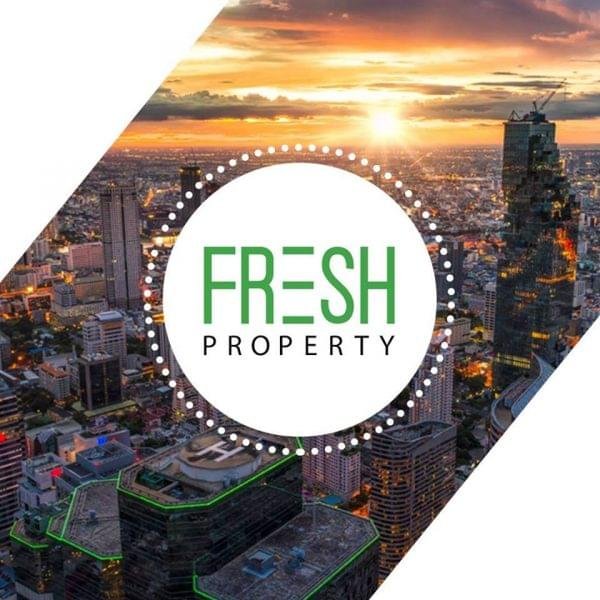Objectives of the Rental Guide
Whether you have recently relocated, or you are a veteran resident, Bangkok’s huge size and expansive neighborhoods can make the process of renting, confusing and overwhelming.
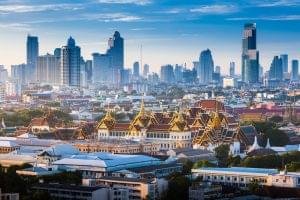
To make matters worse, with little to no reliable English resources available online, renters are often faced with the issue of disinformation. Unfortunately, this makes property searching, signing a lease and eventually living in a rental home, a learn as you go experience.
Through this guide, Fresh’s Editorial hopes to offer a complete resource covering the “A to Z” of renting condos and apartments in Bangkok!
Before Starting this Rental Guide
Fresh Property’s Credentials
If you have just stumbled upon this guide, it is natural to question the authority and experience of the Editorial. Renting is an expensive financial commitment and with so many self-proclaimed experts giving advice online, this is a very understandable concern.
So, what is Fresh Property’s background and experience?
Very simply, we are a modest and hardworking Bangkok Property Agency.
We don’t claim to be the biggest Agency in the Capital and we are far from being “rental wizards”. However, our team rents condos and apartment on a weekly basis and we are proud to have played a small part in the relocation of over-500 renters over the past 3-years.
For feedback on our rental services over the years, please checkout our Facebook or Google Reviews!
With this direct experience, we hope to offer some practical advice that will be helpful to potential renters.
Using this Rental Guide
Our objective is to gently guide renters, reviewing every aspect of the process in chronological order:
- Searching and selecting the right home.
- Signing the rental agreement and moving-in.
- Living in a rental home.
- Moving-out and managing successful security deposit refunds
- Non-standard leases and general info.
As mentioned above, this guide is organized in the chronological format of a rental search. Therefore, renters with absolutely no Bangkok experience, could effectively read this resource from top to bottom like an article.
Alternatively, we have carefully crafted each topic to be standalone and easily understood. Like a Wikipedia-article, there is an interactive table of contents, so feel free to skip to any relevant section or topic.
Each section of this guide will offer practical advice, using simple and straightforward English. On top of this, we have included maps, info graphics and photos of beautiful Bangkok, to give readers an interesting reading experience.
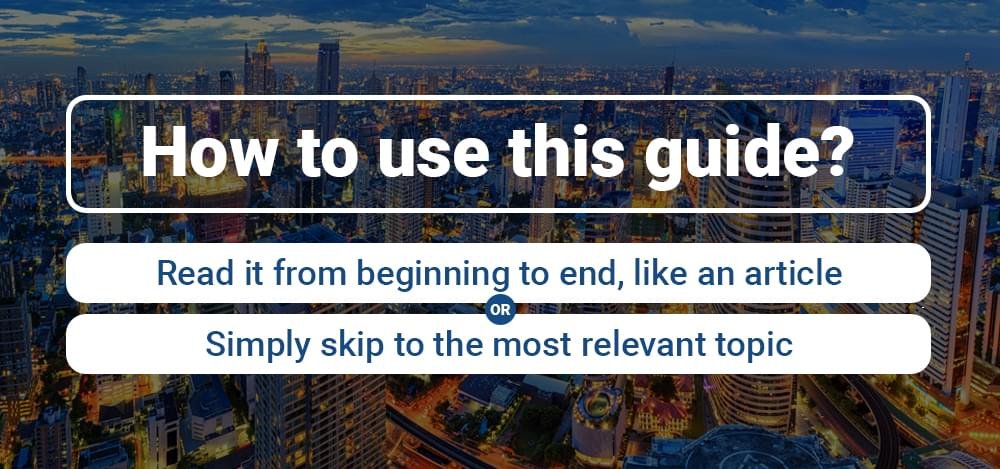
Some topics covered, are expansive and may require further explanations. Readers will come across links redirecting readers to extra-information or sub-topics, peppered throughout this guide.
Finally, please note that “The Ultimate Rental Guide to Bangkok Condos and Homes” is only a small part of a large library of resources that Fresh has been carefully curating. Readers interested in Bangkok’s Property Market can find a wealth of helpful guides, resources and articles on our Useful Info Blog.
Basics of Renting in Bangkok
This topic provides readers an overview of the basics of renting in Bangkok.
The information presented here, should be considered as an introduction to what renters need to know and will allow them to kick-start their property search.
Transport Options and Getting Around Bangkok
New comers to Bangkok, are often immediately stunned and confused by the fast-paced nature of the Capital. The bright colors, loud noises and above all the endless waves of people can make the experience particularly disorientating.
Worry not!
There is a method to all the madness and the City is incredibly convenient.
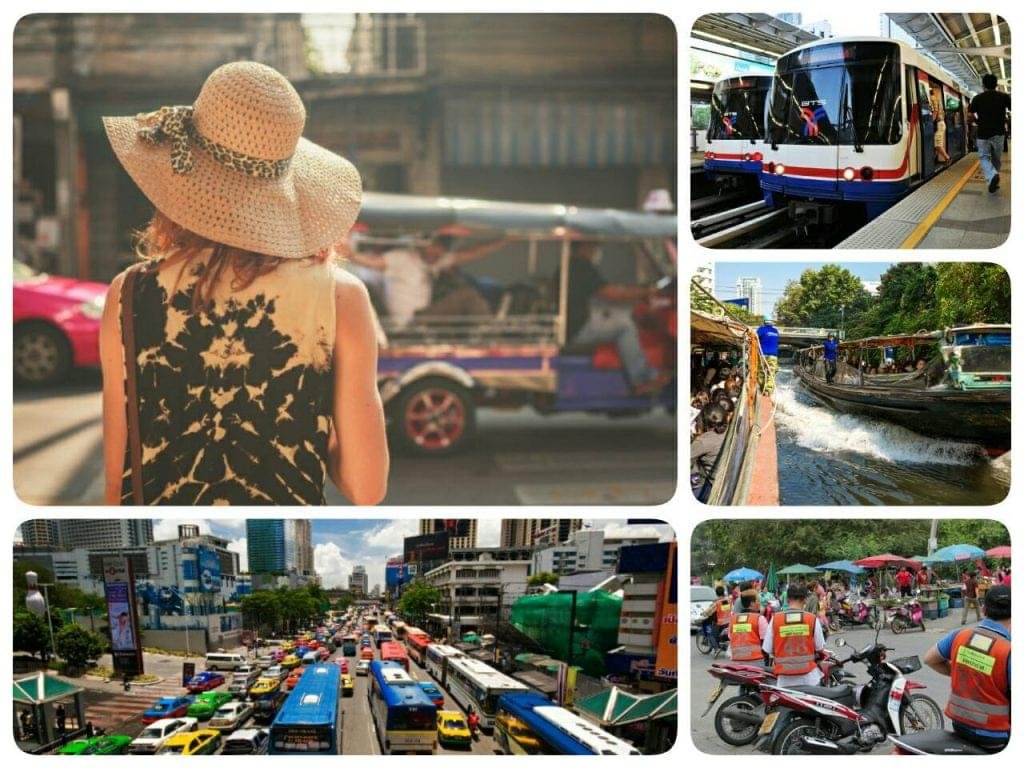
The first step for anyone relocating for the first time, is to understand how to get around. Despite its’ chaotic vibe, the different neighborhoods are well-connected via a variety of transport options.
To review:
1. BTS Skytrain and MRT Underground
By far the favorite option for travelers and commuters, the BTS Skytrain and MRT Underground mass transit systems offer an easy and convenient way to shuttle around the city’s main neighborhoods.
As a rule of thumb, the current BTS Lines tends to cover the downtown business and leisure locations of Bangkok notably Siam, Silom, Asoke and Thonglor. Whereas the MRT offers access to more residential neighborhoods notably Huay Khwang and Ladprao.
2. Taxi (Or Grab)
Taxi services are immediately recognizable by their Taxi signs and bright colors (usually a mix of yellow/green, pink and blue). It is a convenient, safe and affordable way to get around the city. It is important to ask the Taxi driver to travel by the meter and avoid accepting a fixed fare quoted offhand.
In terms of Taxi apps, Uber has been bought over by Grab locally. Therefore, the Grab App is usually the dominant service to get around the city.
3. Motorcycle Taxis
Recognizable by their orange vests, Motorcycle Taxis are a perfect (Probably not the safest) way to wiggle around rush hour traffic.
4. Tuk Tuks
This Bangkok icon is usually available around tourist areas. While a fun way to get around, fares are often expensive as they are quoted by the driver offhand.
5. Airport Rail Link
This light rail service offers a direct and fast way to connect from downtown locations (I.e. Phaya Thai and Asoke) directly to Suvarnabhumi International Airport.
6. Canal and River Boats
Bangkok is often referred to as the “Venice of the East”, its’ majestic Chao Phraya River and its’ city canals offer a unique travel and commuting option for Bangkok’s residents!
The Difference between Condos and Apartments
In certain countries, words such as flats, apartments, units and condos are used interchangeably and more-or-less mean the same thing in a rental context.
However, the eagle-eyed readers may have immediately noticed that the Editorial has been careful to make the distinction between condos and apartments. In Bangkok, these are entirely different types of rental options, that offer their own unique advantages and disadvantages.
Condos
Without going into the legalities of ownership titles in Thailand, condos are simply properties that make-up a condominium project. These condos are usually owned by a private landlord, who may own a single or a portfolio of rental investment properties.
Most renters in Bangkok, will tend to rent privately owned condos. That is because they tend to offer relatively cheaper monthly rates and are better value for money for medium to long rental periods such as 1 to 3-years lease term.
Also, tenants of condos tend to have greater freedom and flexibility when it comes to utilities consumption. Renters are free to install their own internet or cable TV at their own cost. Also, electricity and water bills are based on monthly usage and billed at the standard government rates.
Apartments
On the other hand, apartments are usually whole residential buildings or accommodations owned and managed by a company. The management company is therefore able to control lease agreements and set monthly rental rates for the whole building.
As a rule of thumb, they are comparatively more expensive on a monthly-basis relative to condos.
However, the main advantage of apartment living is they often offer a full-service rental experience. Moving into some luxury apartments is like moving into a hotel; with a full set of linens, cutlery and other amenities. In many cases, apartments come with internet and cable tv pre-installed and can offer add-on services such as housekeeping and linen change services.
Finally, apartments are usually able to offer flexible rental contracts ranging for month-by-month, 6-months, 1-year all the way up to 3-years.
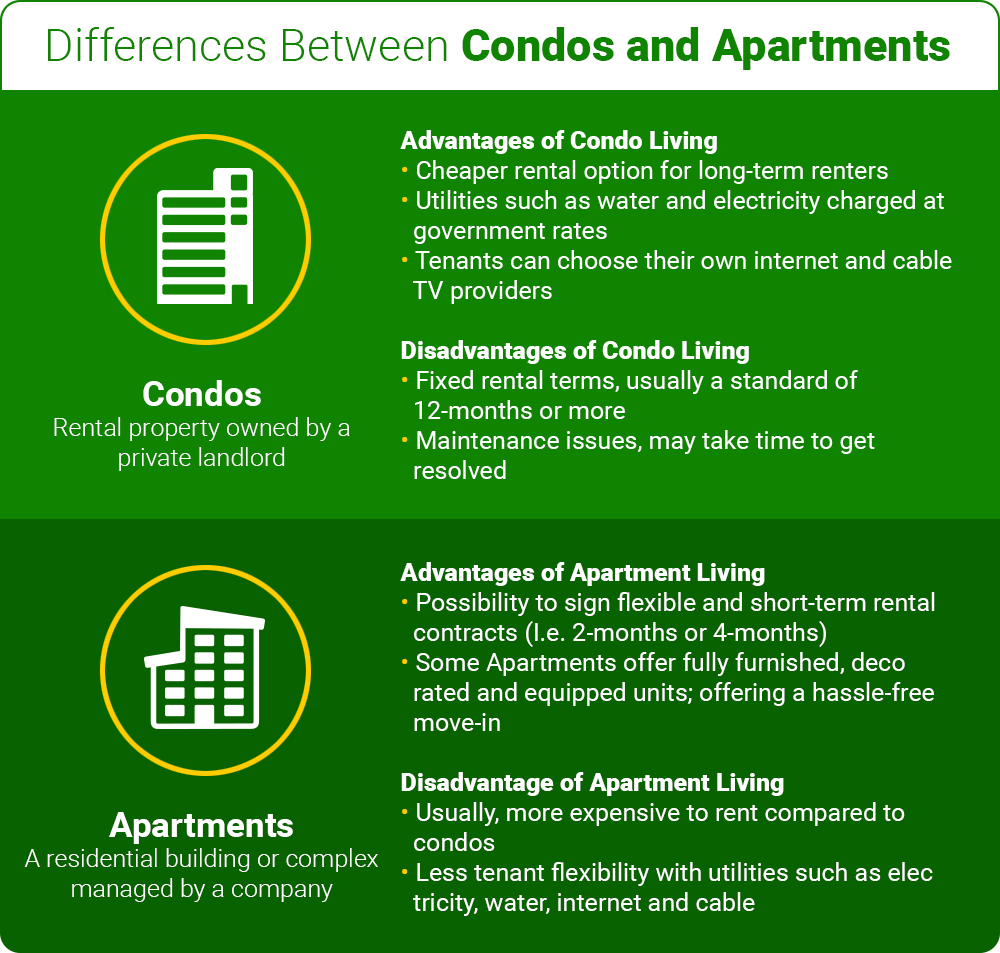
Choosing a Condo or Apartment?
Choosing between a condo or an apartment comes down to the renter’s personal situation and preferences. However, we generally suggest condo living for potential tenants looking for leases between 1-3 years due to the long-term rental cost savings.
As for apartments, we tend to recommend them for professionals on short-stays ranging from 3-6 months or alternatively busy professionals that need a turnkey hassle-free accommodation.
Standard Condo Rental Duration and Overview of Rental Costs
In Bangkok, most condos marketed via agencies or online, are advertised displaying the monthly rental rate based on a 1-year lease.
Generally speaking, landlords tend to favor long-leases from stable tenants that range from 1 to 3-years. Renting for less than 1-year is possible, however it is at the discretion of the landlord or their representative Property Agency.
What are the expenses to signing a rental agreement?
When signing a standard rental agreement, a renter is expected to pay the following:
- 1-Month Advance Rent
- 2-Months Rent as Security Deposit
According to the New Rental Laws effective since 01st of May 2018, if the landlord of a condominium owns more than 5 rental properties they are classed as a “commercial operation”. They therefore can only request for the following:
- 1-Month Advance Rent
- 1-Months Rent as Security Deposit
The New Rental Law, is the subject of much discussion and an in-depth article discussing its implications can be read on: “New Thai Rental Law: What to Expect?”
However, the new law is difficult to enforce, simply because landlords often do not disclose the number of properties they own. Therefore, renters can usually assume they will pay the standard 2-months security deposit.
Any other expenses associated to a rental property?
On the bright side, Bangkok renters are not subject to any council/municipal tax and are not liable for any sort of content insurance or management fee. It is important to note that the annual Common Area Management Fee (CAM Fees) of the Condo, are the responsibility of the landlord.
Tenants are only liable to pay for:
- Electricity Consumption
- Water Consumption
- Wifi and Cable TV Subscriptions (If any)
Electricity and Water remains under the name of the landlord/ apartment and does not need to be switched. However, Wifi and Cable TV Subscriptions are connected to an individual and need to be cancelled before move-out.
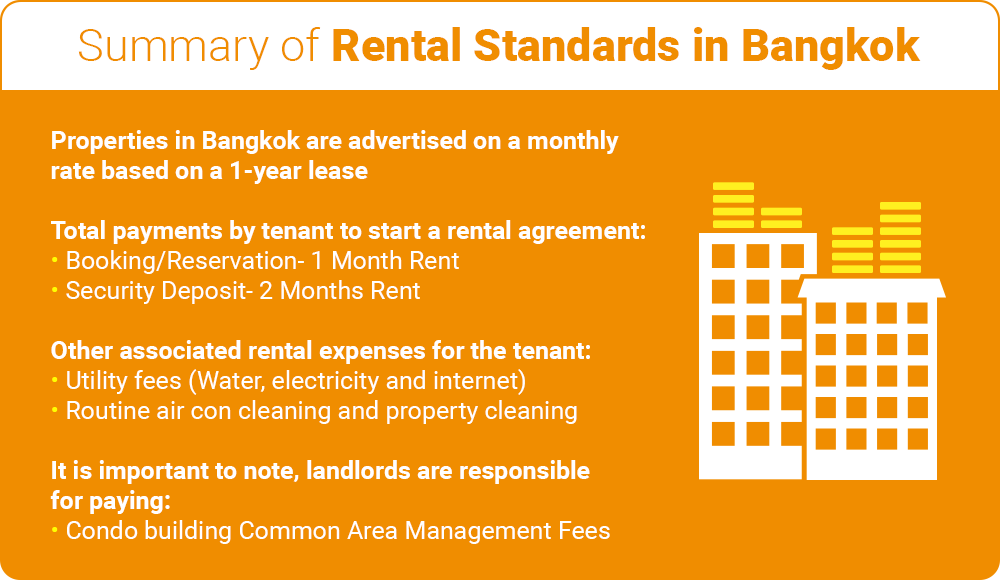
Ways to Find a Rental Home
A big city always offers big solutions!
Bangkok has an active rental market and as a result, there are amazingly convenient ways to quickly browse the market and select a home.
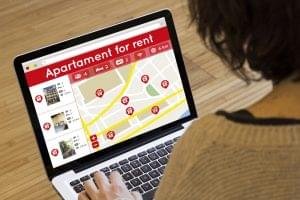
Here are the 3 major ways to find a condo:
1. Walking into Condos or Apartments
Adventurous souls can simple wander around neighborhoods, get lost strolling down side roads and simply walk into a condo or apartment that looks pleasant!
While some buildings will turn renters away, a fair few will have staff that will happily show available rental units. This can be a great way to get a feel for the lifestyle and local environment.
Quick tip, for the savvy individuals looking for bargains by cutting out the “middle-man”, it is important to note that it is common for property agencies to be posted at condos (To capture walk-in clients). Even if a rental introduction is made via the Building Management, they may have a referral fee agreement for doing this.
2. Online, Social Media and Property Portals
A more effective way to locate and research places to live and condos to consider is obviously by going online.
A popular option for most property searchers, is usually to visit a Property Portal that advertises the rental properties of agencies, apartments and private landlords in a single web destination. Some of the biggest and most used portals include Dot Property and Hipflat. As an additional resource for renters, our Editorial has also created a curated list of property websites to help searchers.
A relatively new phenomenon is the use of Facebook to find a rental home via real estate or community groups. This can be a super-convenient and fun way to connect with fellow renters, landlord and agents. However, beware of scammers or trolls, that lurk in the dark corners of these groups!
3. Using a Property Agency
Property Agents in Bangkok are not required to have any real estate license; service standards generally vary greatly between Agencies. On top of this, the trade often attracts freelancers that can either be amazing or total nightmares!
Therefore, carefully check the Property Agency’s credentials and their associated online profile for any “warning signs”.
Putting everything above aside, a professional and efficient Agency can be a great and personalized way to find an ideal rental home. Good property professionals can usually qualify a client’s requirements and quickly offer a set of matching options. This can usually be done in 1-day, 1-week or 1-month depending on the renter’s urgency!
Where to Live in Bangkok?
Bangkok is an amazing cosmopolitan hub in the heart of South East Asia. It offers a vibrant and exciting living experience, offering a contrasting blend of fast-paced trendy hotspots as well as peaceful and serene enclaves.
However, the sheer scale of the Capital means that selecting the right location to suit your lifestyle, can be a daunting and confusing task, especially when you are new comer.
Worry not fellow renter, this section will be dedicated to reviewing the most popular residential areas!
The Most Popular Neighborhoods
Area guides can often be a subjective topic; as there is no one-size-fits-all solution and different places will inevitable suit different kinds of people!
Luckily Bangkok offers an incredible variety of options, to suit all lifestyles and budget ranges. Generally, Expats and Thais tend to favor Central Bangkok locations where most of the business, leisure and retail districts are located.
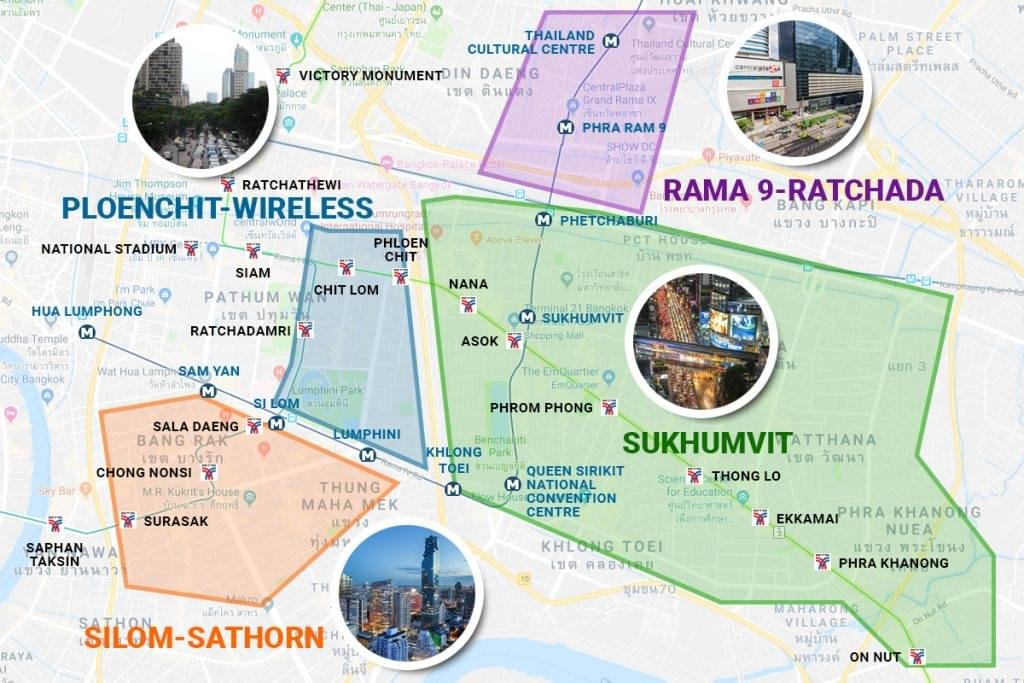
When referring to Central Bangkok, this usually encompasses several large districts notably:
- Sukhumvit
- Silom-Sathorn
- Ploenchit-Wireless
- Rama 9- Ratchada
Each district offers a completely different character and lifestyle, that appeals to different types of people. To make sense of Bangkok, its residents usually name areas after the closest Mass Transit (BTS/ MRT) Station that services their neighborhood.
Let’s review the lifestyle offered by each district:
1. Sukhumvit
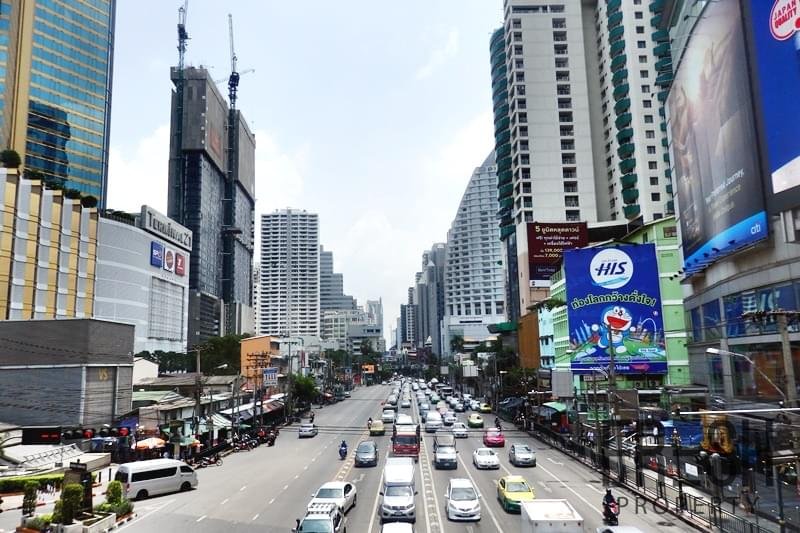
The expansive area is named after “Sukhumvit Road” the iconic thoroughfare. The major road runs along the area, servicing and connecting residents throughout this section of Bangkok. Sukhumvit is essentially made-up of Sukhumvit Road and its interconnecting side-roads that form an eclectic collection of neighborhoods.
This district offers a wide range of lifestyle diversity; with business neighborhoods such as Asoke, leisure and retail hotspots such as Phrom Phong, Thonglor and Nana, and quieter residential areas such as Phra Khanong.
The advantage of selecting this district is its travel convenience, great work-life balance and the diversity of rental rates available to suit different rental budgets.
The main neighborhoods within Sukhumvit include:
Nana
Asoke
Phrom Phong
Thonglor
Ekkamai
Phra Khanong
On Nut
2. Silom-Sathorn
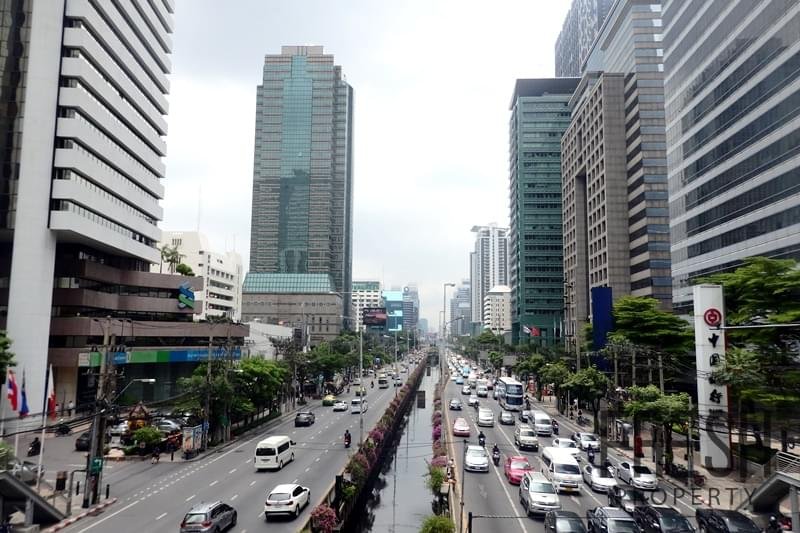
Often compared to London’s City or New York’s Wall Street, Silom-Sathorn is Bangkok’s financial hub. This unique brand is derived from the fact that Sathorn Road is a hotspot for the city’s financial institutions such as Banks, Private Equity, Investment Funds and Insurance.
Despite its edgy banking and finance appeal, the area offers a blend of ultra-modern and nostalgic-retro vibe. One of the oldest sections of the Central Business District, the area manages to offer old world charm complemented by a convenient and vibrant lifestyle.
The area offers some of Bangkok’s most iconic skylines and this association has given Silom-Sathorn a unique classy-modern cachet. As a result, the housing options offered in this section of the city tend to be pricier compared to areas such as Sukhumvit.
Neighborhoods within Silom-Sathorn include:
Saladaeng (BTS)/ Silom (MRT)
Chong Nonsi
Surasak
3. Ploenchit-Wireless
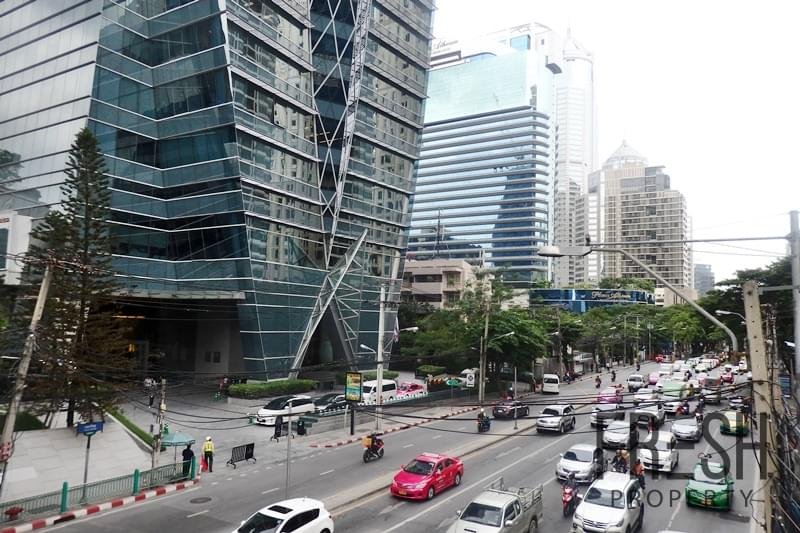
Sandwiched between Sukhumvit and Silom-Sathorn, this district is often considered Bangkok’s most prestigious address. Located in the neighborhood is Wireless Road, a chic avenue lined with a handful of embassies, A-grade offices and luxury residences. Some notable nations with a diplomatic presence in the area include the United States, Japan and Switzerland.
The area is a combination of residential and business, offering a pleasant and classy-chic living environment. The neighborhood is also in proximity to luxury lifestyle destinations such as Central Chidlom and Central Embassy shopping malls. As a result, the housing options offered tend to be the priciest in the capital.
Neighborhoods within Ploenchit-Wireless include:
4. Rama 9- Ratchada
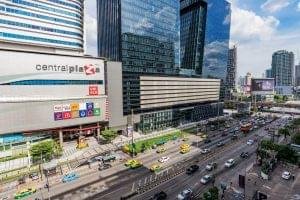
Often dubbed the “New Central Business District”, Rama 9-Ratchada is a new and fresh neighborhood. The vibrant district is a business hotspot and it hosts numerous spanking new office towers that houses a range of local and international companies.
In terms of lifestyle, it offers a convenient living environment with shopping malls, eateries and cafes. At night the area comes to life with a trendy nightlife scene with the iconic Ratchada Night Market, clubs and bars. As a result, the area is popular with young working professionals.
Housing options in this part of Bangkok tend to be modern in style, developed by a range of developers to a variety of specifications.
Neighborhoods within Rama 9- Ratchada include:
Underrated Neighborhoods for the Adventurous
This is a huge topic, especially considering the massive size of Bangkok, with its hundreds of areas and condos. However, to keep things simple the Editorial will only review a handful of neighborhoods for renters who would prefer something “off the beaten track”!
Bangkok Riverside (Saphan Thaksin- Thonburi)
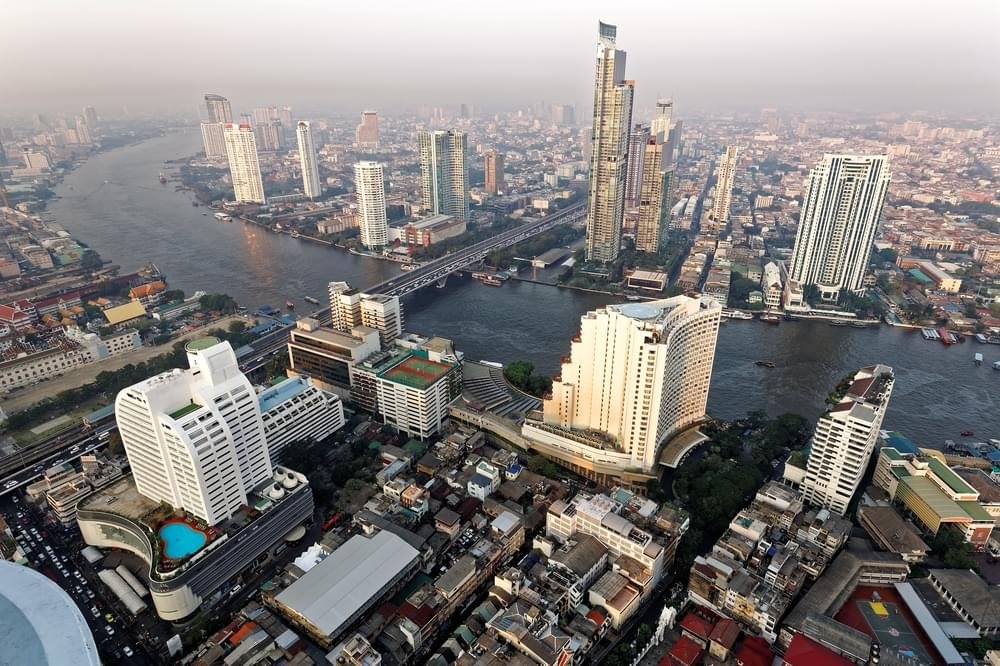
A charming and peaceful area, offering a nostalgic throwback into old world Bangkok. The area is generally a collection of shophouses, sprinkled with a few high-rises and the occasional mall.
The soothing river environment complemented by the relaxed lifestyle offers a perfect getaway from the Central Bangkok’s hustle and bustle. Unlike the business district, the area is still developing and is therefore ideal for people wanting to experience old Bangkok!
Ladprao- Phahon Yothin
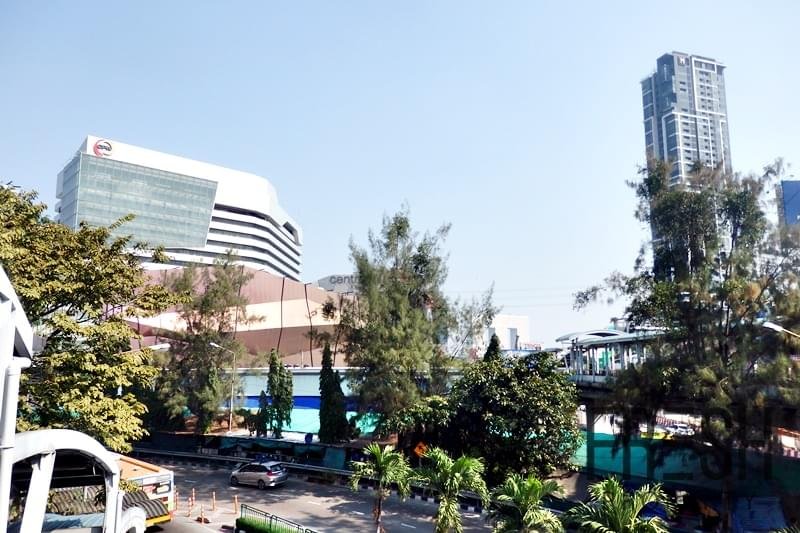
Generally considered a Thai residential area, it has becoming a popular hotspot for residents priced out of Central Bangkok.
The area has developed a charming community vibe, with the interconnected side-roads of Ladprao and Phahon Yothin offering a range of eateries. restaurants and coffee shops.
The neighborhoods offer a range of accommodation options from condos, apartments and houses. These offer excellent value, especially compared to downtown Bangkok.
Udom Suk-Bangna
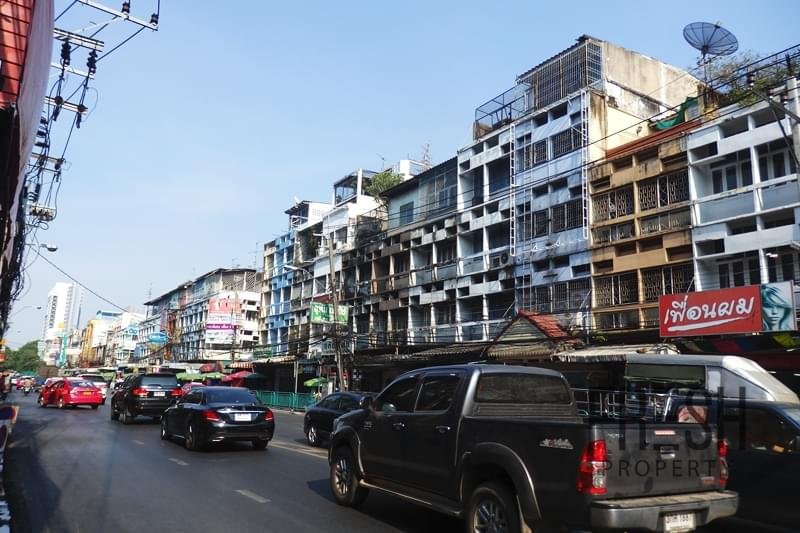
Located in Outer Sukhumvit toward the end of the BTS Green Line, it is a bustling and vibrant Thai residential area.
The neighborhood offers residents a range of local eateries and restaurants, allowing renters to experience a local and affordable way of life. Udom Suk- Bangna generally offers affordable and great value condos and house options.
Phaya Thai-Ari
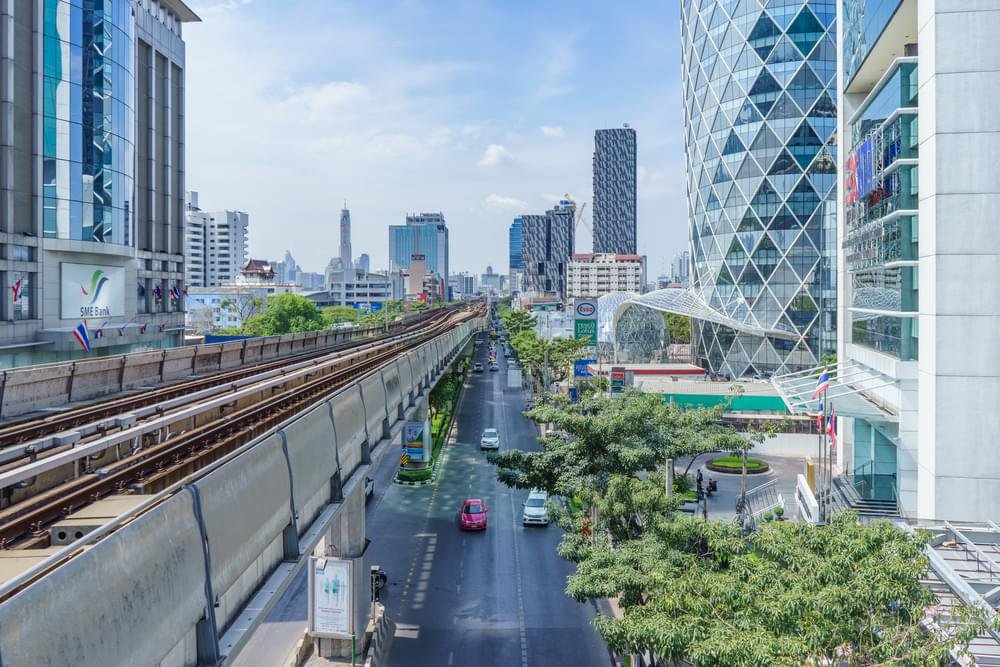
A trendy and eclectic section of the Capital, with many residents viewing the neighborhood as a “Central Business District” in its own right. The area is conveniently located and is serviced by the BTS Line. On top of this, Phaya Thai- Ari is in proximity to the Siam retail district offering residents easy access to shopping malls such as Siam Paragon, Central World and Platinum.
Interestingly, the area harbors a diverse range of lifestyles from Phaya Thai’s business hub to Ari’s hip leisure environment. Offering a wide variety of rentals options to property seekers.
This enviable lifestyle contributes towards making the Phaya Thai-Ari areas an appealing and desirable address!
Budget Considerations and Cost of Renting
Bangkok is an enormous city, with residential options to suit all budgets. However, to offer a general expectation of what renting in Bangkok costs, the Editorial will provide budgeting advice based on properties as follows:
– Only in Central Bangkok locations.
– Only Condos.
Based on these two assumptions, let’s review options:
Studio & 1-Bed Condos
– Under 10,000 THB Per/Month
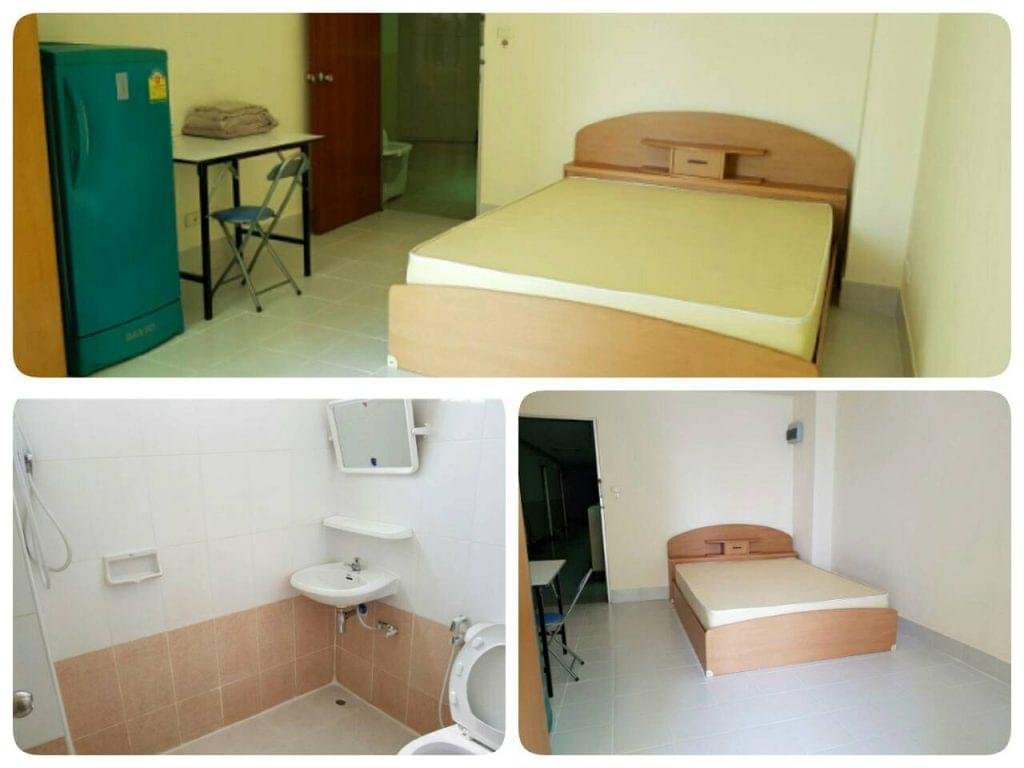
It is possible to find basic studio type accommodation in Central Bangkok. These will often be very basic in style and offer very compact layouts.
These properties tend be located further away from BTS/ MRT and offer little to no building facilities (I.e. Pool or Gym).
– 12-20,000 THB Per/Month
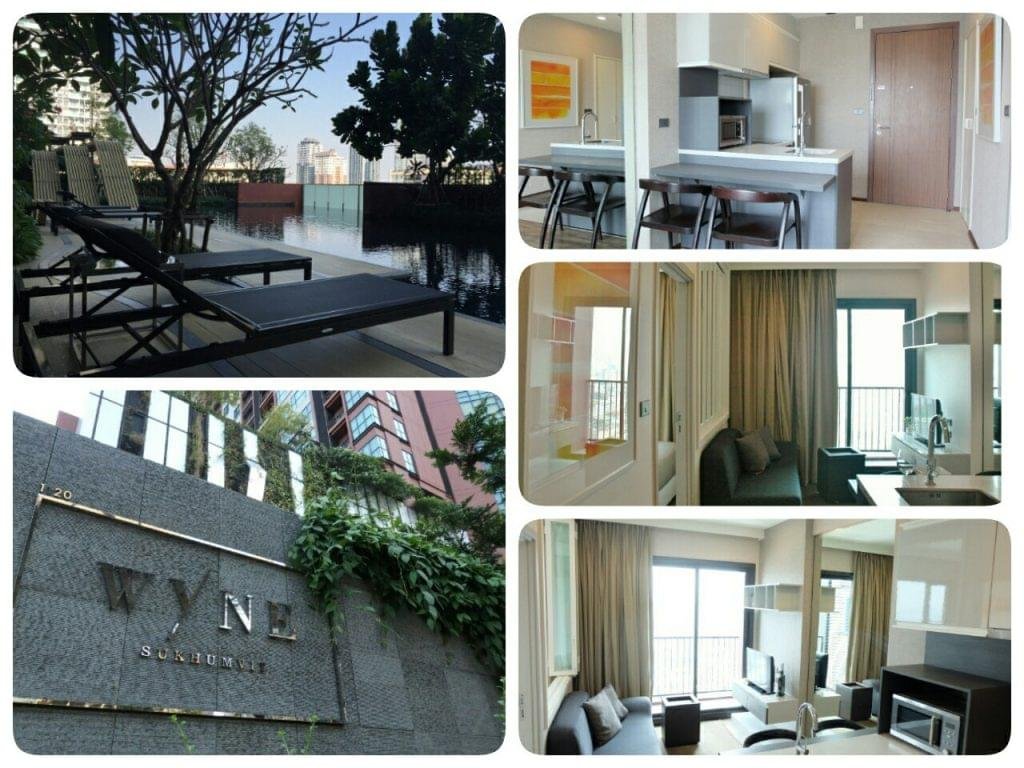
Generally, a more comfortable monthly budget for Bangkok; several condos in areas such as On Nut or Phra Khanong are available at that price range.
Condos between 12-20,000 THB are usually between 30-40 square meters with modern layouts. The projects often have comfortable amenities such as pools, gyms and rooftop gardens.
Depending on the neighborhood and quality-level of the condo, it is possible to have options located within walking distance to BTS or MRT stations.
– 20- 30,000 THB Per/Month
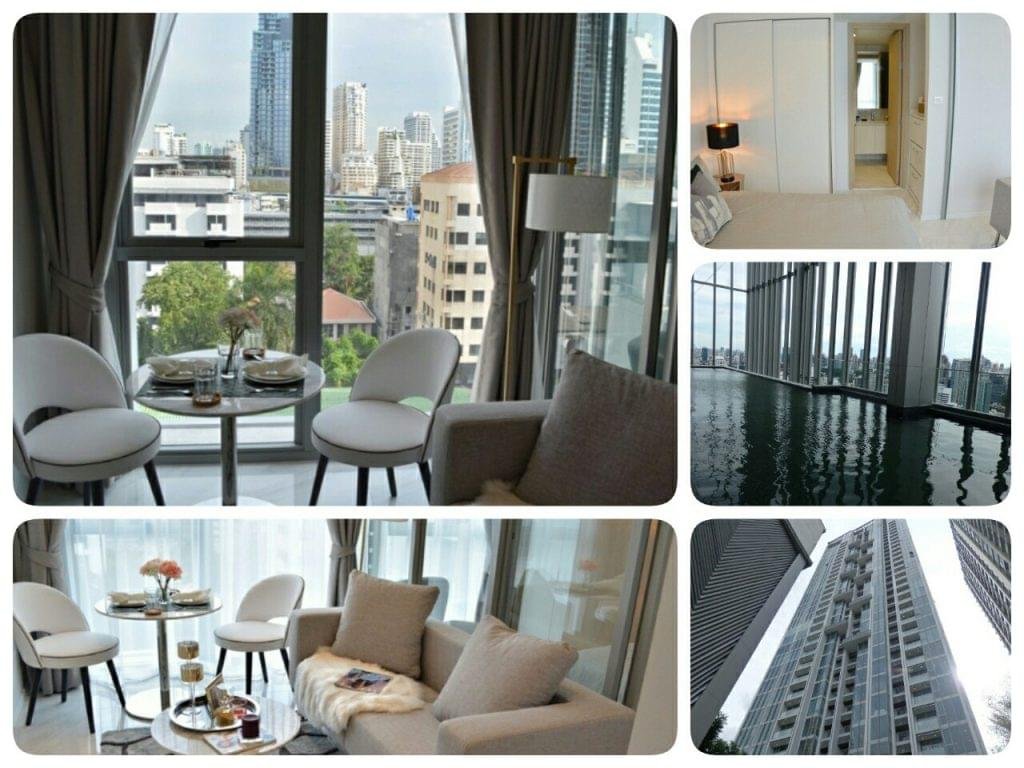
This budget opens a new level of lifestyle and comfort!
Renters able to spend 20-30,000 THB monthly, can get access to condos located in prime locations that offer larger and more luxurious interiors.
The condo projects on that level, are also usually plush offering a wider array of luxury facilities such as infinity pools, fitness centers, co-working spaces, sky lounges, etc.
2-Bed Condos
– 30-45,000 THB Per/Month
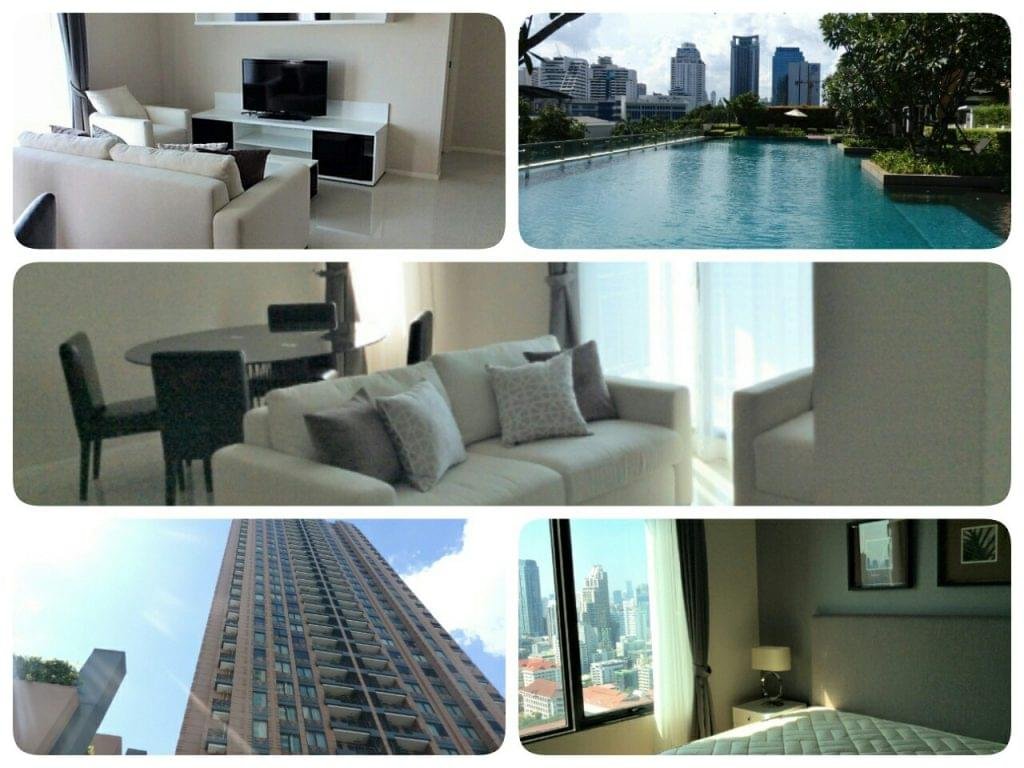
In Bangkok, space comes at a premium and the layouts of condos are unfortunately getting smaller. It is possible to rent 2-bedders between 30-45,000 THB monthly, layouts range from compact 45-75 sqm in modern projects to 75-100+ sqm in older condos.
The quality of the condos offered are usually good-standard with a range of luxury facilities and conveniently located in proximity to BTS or MRT.
3-Bed Condos and Family Sized Units
– 50,000 THB+ Per/Month
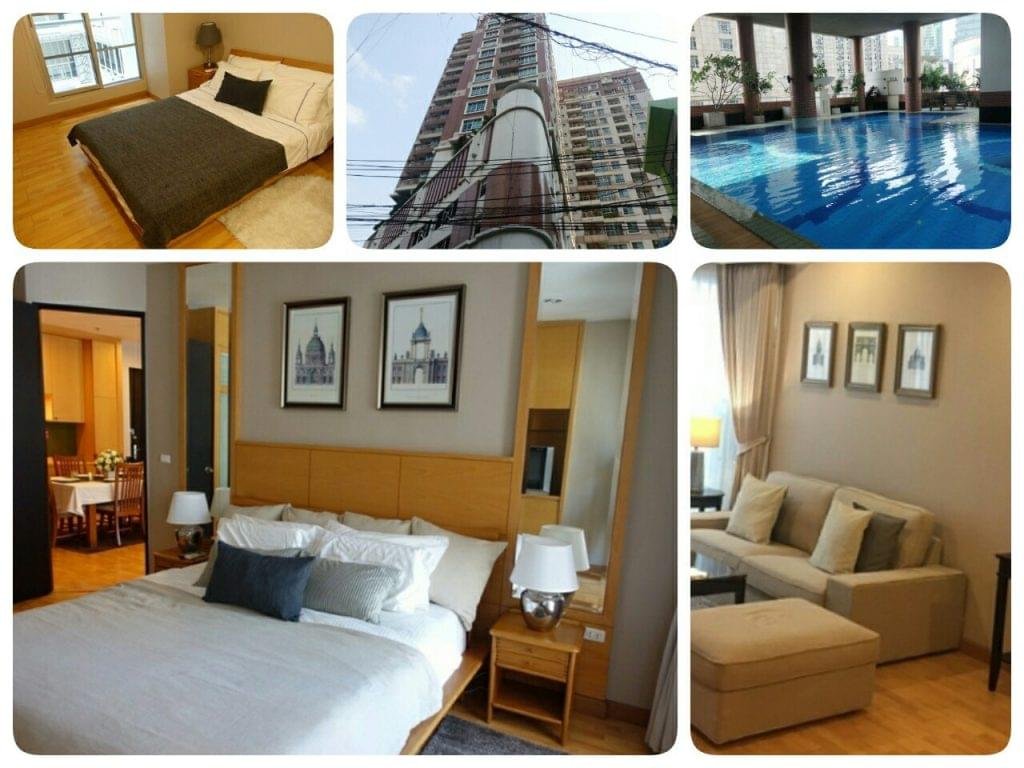
Families or sharers looking for large units with spacious layouts will need to consider pricier monthly rentals. The quality and location of these condo units can vary greatly.
A few final words on Rental Rates…
The monthly rental rates above, are generalizations and have been simplified for this guide.
Bangkok is a large and often confusing city, with different condo options to meet a wide variety of needs. The Editorial generally advises discussing property requirements with a Property Agent, that could assist by offering a personalized shortlist of options suitable to a searcher’s budget!
What to Expect from Bangkok Condos and Apartments?
Renters new to Bangkok, are often unsure what to expect in terms of quality of local residential buildings.
This section will allow property searchers to have a better understanding of the residential standards and unique lifestyle offered by the City’s housing solutions.
High Rise or Low-Rise Living
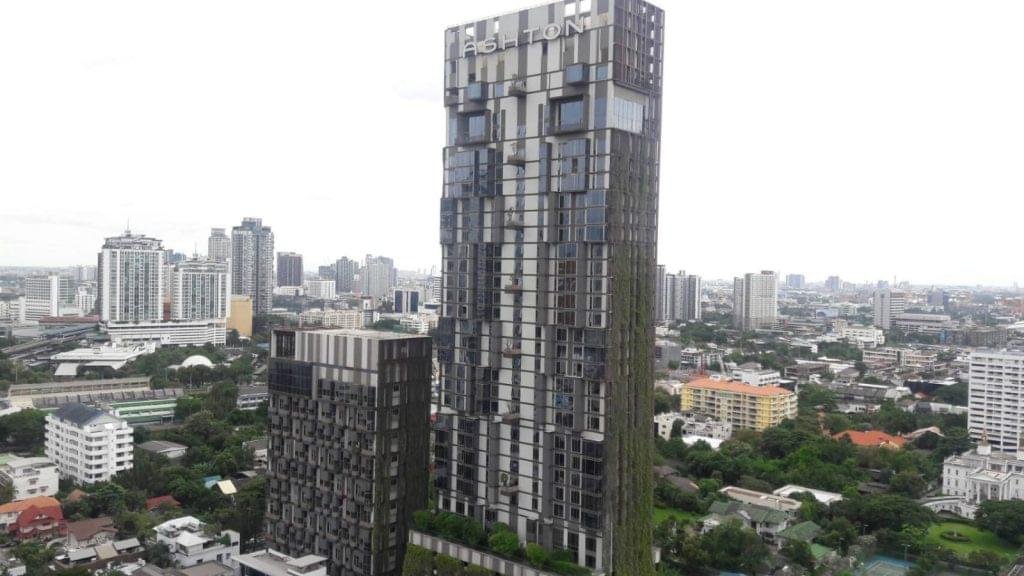
When selecting a condo, the first consideration is usually whether to go for a low-rise or high-rise building. These two types of buildings often offer completely contrasting lifestyles that might appeal to vastly different tenant profiles.
Low-Rise Condos
In Bangkok, Low-Rise condominiums are between 7-8 floors to comply with the City’s building regulations. Again, as a result of city planning laws, low-rise condos are developed on quieter side-roads (Locally known as “Sois”) adjacent to major arteries such as Sathorn Road, Sukhumvit Road or Ratchadaphisek Road.
Low-rise projects usually offer more peaceful and private living environments, as buildings are often less densely populated. As a result of their location, they are often located in quiet surroundings and are located away from noisy main roads.
However, due to the building size restrictions of low-rise condos they are often equipped with more modest facilities such as smaller pools, compact gyms and modest communal areas.
High-Rise Condos
In comparison, high-rise condos are usually located on the main roads such as Sukhumvit Road and are more conveniently accessible. They are much grander and larger, as a result they are more densely populated and offer a more social and vibrant living environment.
It is a competitive marketplace for Condo developers, so many builders equip high-rise projects with amazing facilities such as infinity pools, large fitness centers, libraries and sky-lounges. These amenities combined with the general living environment, can often be compared to a “hotel experience”.
These large towers are usually mores suited for young professionals looking for an active lifestyle offering!
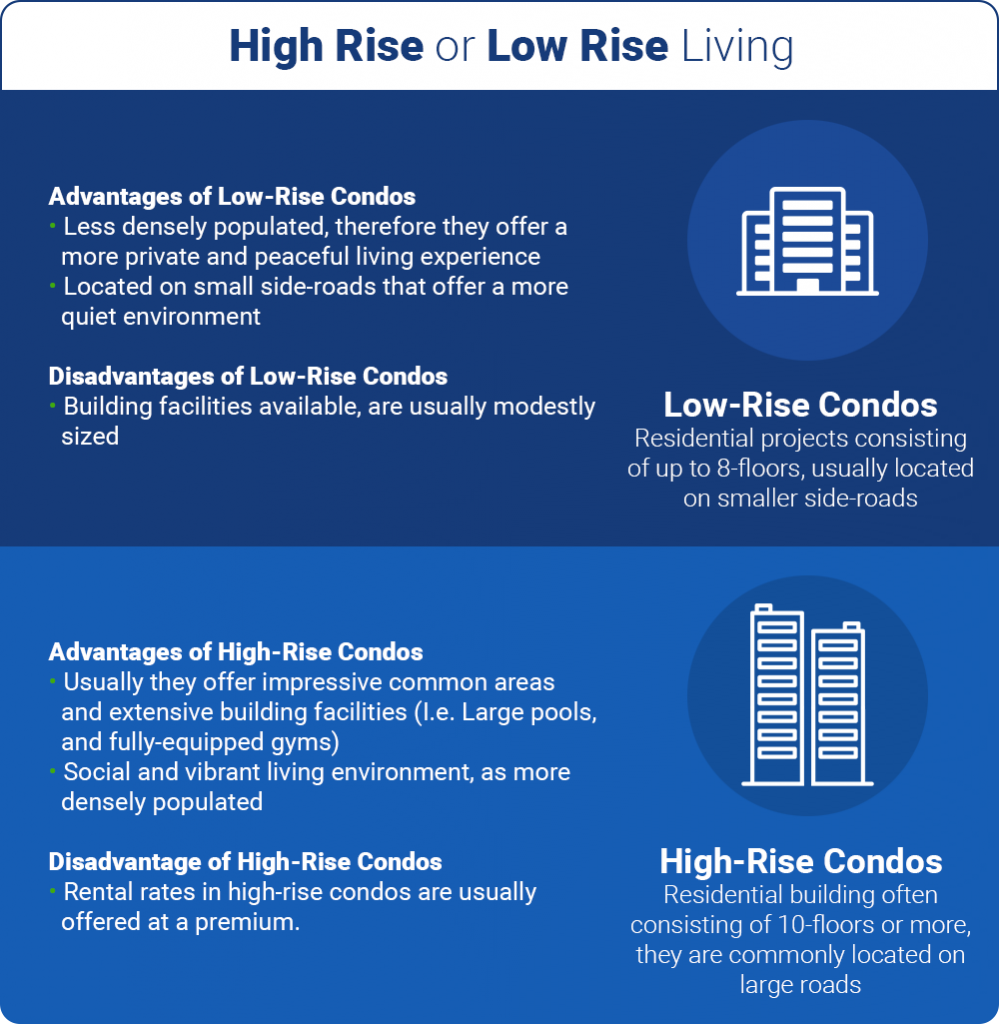
Old or New Condo and Apartment Buildings
The notion of old and new buildings may seem like an odd concept for newly-arrived expats; especially those coming from Europe where buildings often carry a lot of history and cultural relevance. However downtown Bangkok is relatively modern and locally any condo building above 10-years of age is generally considered “old”. Especially compared to the spanking new launches that are constantly hitting the market.
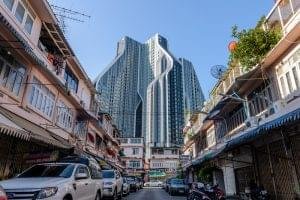
Older Buildings
Any condo or apartment over the construction age of 10-years is considered old, however “older buildings” are not necessarily a negative thing.
For several years, Bangkok’s booming residential condo market combined with spiking land prices has resulted in smaller and smaller unit layouts. Older buildings were not subject to these market dynamics; as a result, they often offer larger and more spacious layouts.
Interestingly, in a City where almost every condo is equipped with luxury-amenities, “space” becomes the ultimate luxury!
Unfortunately, some older buildings routinely suffer from poor-management and low-maintenance. As a result, the common areas of some older projects often look outdated or even gritty.
Newer Buildings
Newer Projects often have a fresh and exciting appeal; they often benefit from the novelty factor and are always well-regarded. There is a certain glamour to living in a newly completed condo!
Recently launched projects, are often equipped with ultra-stylish amenities catering to its residents such as expansive pools, full-equipped gyms and classy modern lounges. Making the living experience like that of a resort.
However, there is usually a premium to pay for the new condo living experience and rental rates are often a lot more expensive compared to similar older buildings.
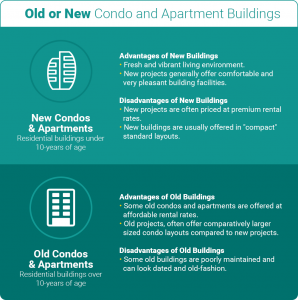
Reasons Why Bangkok Housing Options are Amazing!
Bangkok is an amazing city, offering both professional opportunities and an amazing lifestyle to its residents. Its popularity as a global destination, combined with the City’s rapid development has created a unique housing experience like no other!
Condos and apartments offer a luxury living experience, that will often surprise, and amaze freshly arrived expats.
Here are some amazing reasons, why Bangkok’s condo and apartment options are awesome:
– Expansive Swimming Pool and Sunbathing Areas
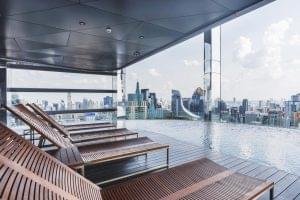
Most projects are equipped with large pools ideal for a bit of self-indulgent relaxation!
– Gyms and Fitness Centers
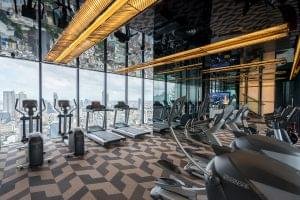
Bangkok is a health-conscious city and fully-equipped gyms with treadmills and weight machines are often readily available.
– Extra Facilities
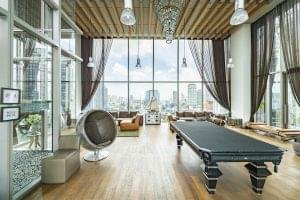
Sky-lounges, libraries, co-working spaces, golf simulators, squash courts, tennis courts, bowling alleys… the possibilities are endless!
Some condos really offer a range of leisure and relaxation facilities that redefine “luxury living”!
– Building Management and 24-hr Security
Condos and apartments in Bangkok offer an incredible amount of security and convenience.
Building Management of residential buildings, often have technicians and handymen on-hand to attend to any maintenance issues.
The Rental Process, Lease Agreements and Negotiations
In this section the Editorial will familiarize renters with the process of negotiating, reserving and signing a rental lease.
The basic process of renting will be covered in depth and readers will have a better understanding of Bangkok’s rental standards.
Step-by-Step Overview of the Rental Process
Surprisingly, renting in Bangkok can be an incredibly straightforward process.
Normally, depending on the urgency, searching, selecting, negotiating and moving into a property could take as little as 2-days. However, Fresh tends to advise renters to set-aside at least 1-week to offer a comfortable timeframe to avoid any unwanted issues when moving-in.
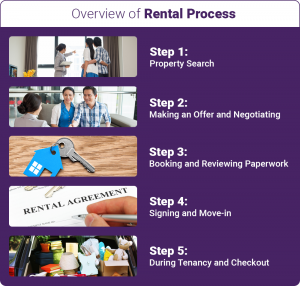
The rental process, can be broken-down into 5 steps:
- Step 1: Property Search
- Step 2: Making an Offer and Negotiating
- Step 3: Booking and Reviewing Paperwork
- Step 4: Signing and Move-in
- Step 5: During Tenancy and Check-out
Step 1: Property Search
Bangkok is a huge and confusing city, with potentially hundreds of neighborhoods, condos and lifestyle options. Therefore, it is always important for the renter to do some personal research and determine their core requirements:
-Budget Range
-Preferred Locations
-Minimum Beds/ Bath Required
-Facilities Requirement (I.e. Pool, Gym, Close to any specific amenity)
Once the rental needs are confirmed, usually the easiest way to kickstart a search is to browse Property Portals and subsequently contact reliable Property Agencies advertising on these platforms.
Local Property Agents can usually save renters a lot of time, by conveniently shortlisting potential areas and condos suitable for the renter’s lifestyle.
Step 2: Making an Offer and Negotiating
After a few rounds of viewings once you have selected and found your ideal rental home, renters are expected to make an “offer”. It is important to note, in Bangkok negotiating the price and conditions of the lease is perfectly normal and accepted practice.
Property Searchers tend to negotiate the following:
-Rental Price
-Lease Start Dates
-Length of Lease (I.e. 1 Year, 1.5 Years, 3 Years…)
-Special Requests (I.e. New Mattress…)
When making an offer, it is important to searchers to be clear on:
-Acceptable Rental Rate
-Signing and Move-in Date
-Length of Lease
When negotiating, it is important to be clear and decisive to improves chances of an offer being accepted.
Step 3: Booking and Reviewing Paperwork
Once the offer and the associated conditions have been accepted by the landlord, it is standard for a non-refundable booking fee equivalent to 1-month rent to be collected by the Agent/Landlord. This is to reserve the property and to ensure the landlord stops all marketing activities.
Before making any rental transfers, check the credentials of the Property Agency or Landlord and ensure that receipts are provided especially if the booking is paid cash.
Upon the payment of the Booking Fee, the Lease Agreement and Inventory should be drafted. This usually requires the renter to provide a copy of their Passport; requesting visa or work permit copy is at the discretion of the landlord. Once the draft documents are ready, they should be sent to the tenant for review.
Once the documents are ready, usually a fixed signing date is confirmed by all parties.
Step 4: Signing and Move-in
In Bangkok, it is standard for all parties (Landlord, Property Agent and Renter) to meet on the signing date at the property. On that date lease agreements and inventory are rechecked, confirmed and signed.
It is important to have a quick walk-around the property to check and record any faulty appliances, defects or damages that were present prior to move-in.
Finally, once the formalities are completed the renter will have to pay the security deposit equivalent to 2-months’ rent.
Step 5: During Tenancy and Check-out
If a renter encounters any issues during the tenancy, they can usually contact the Property Agent or Landlord. For minor issues such as loose fittings (I.e. Towel Rails), popped light bulbs or access card issues tenants can contact the Building Management.
At the end of the agreed lease period, if the tenant decides not to renew their rental agreement, they can provide a 30-day notice. Upon check-out, the property’s condition is inspected, and any potential deductions are discussed and negotiated. Security deposit after deductions, is refunded within a standard 30-days.
Quick Review:
-If an offer is accepted, it is standard for a tenant to pay a Booking Fee of 1 Month Rent to reserve the property. This payment usually goes toward paying the advance rent of the 1st month
-In total a tenant is expected to pay 3 Months’ Rent to start a new lease. (1 Month Advance Rent and 2 Months Security Deposit)
-Security Deposit is refundable at the end of the lease; generally, it is refunded within 30-days upon move-out.
Pet Friendly Accommodation Options
Despite being a large city, Bangkok can be notoriously difficult for pet owners. As many condo and apartment buildings have strict “no pets policies” that they rigidly enforce. Therefore, any renter with a domestic animal is usually advised to consider only pet-friendly accommodation.

On top of this, dog owners are advised that several buildings also have weight and breed restrictions with most condos or apartments only allowing lap dogs. Owners of big-sized dogs such as German Shepherds, Golden Retrievers or Huskies are usually advised to consider renting a pet-friendly townhouse or single house.
Some renters, especially those with small-sized pets such as cats or small lap dogs may cheekily considers sneaking a pet into their property despite these rules. While this does happen, the Editorial would advise against this idea.
Building Management and landlords have the power to force a termination of a lease agreement and potentially confiscate the security deposit. Therefore, to avoid any disputes or uncomfortable situations, it is always best to be honest and open about keeping a pet.
Usually the best way to find pet-friendly condos and homes is to work directly with a knowledgeable Property Agency.
For a list of Pet Friendly Options: Pet Friendly Condos and Apartments in Central Bangkok
Negotiating Lower Rental Rates and Getting a Bargain!
In Bangkok, there is most definitely a culture of negotiating and getting a bargain!
The prices of property listings advertised by Online Portals and Agencies are usually always negotiable and renters are encouraged to try and get a good deal. When it comes to getting discounts, there is no hard and fast rule and renters should always consider properties on a case-by-case basis.
However, there are always a few tactics to encourage the landlord to knock-down the rental rate:
-Long Leases
The standard lease period in Bangkok is 12-months, however being able to commit to longer leases (I.e. 18 Months, 24 Months, or more…) is often a big incentive for Landlords. Many will consider offering larger discounts, in exchange of the stability of a long-term tenant.
-Immediate Move-in
Bangkok is currently a tenant’s market, with several rental properties being advertised on the open market for significant amounts of time. Landlords are therefore often swayed by a renter that can move-in and start their contract the “following day”.
-Personal Profile Up-sell
All landlords secretly worry that their next tenant may turnout to be a nightmare!
Therefore, many will often be willing to negotiate simply based on having a tenant from a strong social or economic background. Therefore, renters shouldn’t be shy about flaunting their professional occupations and their credentials!
If you are a hard negotiator or simply like getting good deals, perhaps checkout: “Tactics to Negotiate a Lower Monthly Rent!”
Reviewing Standard Rental Terms and Conditions
Lease agreements provided by Landlords or Rental Agencies can vary greatly in terms of standard and scope; some are very basic consisting of only 2-pages, while others are more extensive 8-page memorandums!
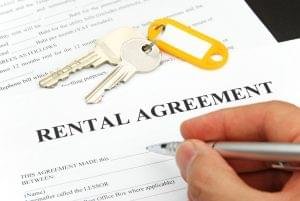
However, lease agreements should not be taken lightly as they offer a set of mutually accepted guidelines to be respect by both the renter and their landlord. The terms and conditions set out in the lease agreement, is usually used to resolve and mitigate disputes. A good Agreement should always offer balanced and fair protection to both parties.
There are usually 5 key sections in a Bangkok Leases:
-Rental Price and Tenancy Details
This is usually the core of the Rental Agreement and it should set out the mutually agreed monthly rental rate and the length of the lease (With an exact start and end date). Rent is paid in advance at the beginning of each month and most balanced agreements will offer 3-5-days grace period for payments.
-Tenant Responsibilities
The tenant should enjoy the property peacefully without causing disturbance to the building’s neighbors or management. Also, tenants need to maintain the property in acceptable condition, refraining from any disruptive or illegal activity. Some standard conditions include not to smoke indoors, not to keep pets or not to sublet the property.
-Landlord Responsibilities
Landlords also owe a duty of care towards their tenant.
The landlord is usually responsible for preparing and ensuring the property is habitable pre-tenancy.
During the tenancy, the landlord is responsible for any maintenance issue not directly caused by the tenant.
-Lease Termination
This section of an agreement should protect both the tenant and landlord.
On the one hand, it protects the landlord providing grounds for forced evictions in case of mischief such as non-rental payments.
Tenants are protected from “acts of god” (I.e. Fire, or Floods) and from major issues that prevent them from peaceful enjoying the property. On these grounds, the tenant can usually recover their security deposit and end the lease.
-Moving-Out Process
Lease agreements should have a clear move-out protocol.
The standard is usually for the tenant to give 30-days’ notice prior to move-out; ensuring the property is in good condition and all access keys/cards returned upon checkout.
The agreement should confirm that security deposit is refundable, subject to property damage deductions.
During the Tenancy, Maintenance and Repairs
When renting a condo, there will inevitably be a certain amount of property upkeep and maintenance. As the saying goes “life happens”!
From little issues such as popped light bulbs and sofa stains to more serious matters such as malfunctioning water heaters and burst pipes; this section will give renters a brief overview of how to handle repairs.
On top of this, there will be a brief discussion on late rental and utility payments.
Who is Responsible for the Cost of Repairs?
A frequent concern for most renters:
“Who is responsible for the cost of maintenance and repairs?”
While there are no strict rules to go by, generally minor costs under 1000 Baht are usually at the expense of the tenant. This rule usually covers ordinary wear-and-tear and any issue directly caused by the renter. This includes minor problems such as popped light bulbs, loose wardrobe handles or routine air-con cleaning.

However, if any major repair works is required as a result of issues beyond the control of the tenant, the landlord would usually step-in to cover expenses. This usually includes issues that prevent the peaceful enjoyment of the property such as a water heater breakdown, water leaks from the unit above or electrical problems.
If there are any home maintenance problems, the first “port of call” should be the Building Management office. They usually have technicians available to inspect the situation and provide solutions.
Missing Rental or Utility Payments?
Firstly, to set the record straight, it is always best to avoid missing rental and utility payments. It is important to note that in Bangkok, landlords hold the rental security deposit and therefore it is always in the best interest of the renter to uphold a clean record and a good reputation.
However, overlooking these payments do happen for time-to-time!
Here are some quick tips:
Rental Payments
In these situations, most rental agreements offer a grace period of around 5-days to the tenant.
If there is a possibility that the payment will be delayed beyond this period, tenants should always inform the landlord and provide valid reasons for the lateness.
Utility Payments
Firstly, for water bills a delay is usually not a big concern. Water supply in condos and apartments is usually handled by the building and therefore any late payment issues can often be resolved by visiting the Management Office.
Electricity bills are usually a more serious affair, as the city’s electricity administrator the Metropolitan Electricity Authority (MEA) physically come and remove meters. Before doing so, they will usually give notice to the Management Office, who inevitably informs the landlord.
If the electricity meters have been removed, renters need to physically visit the local MEA Office to clear outstanding balance and late payment penalties.
End of the Tenancy, Checkout and Deposit Refunds
Unfortunately, all good times must come to an end!
All renters will eventually need to move-out and in the process experience a formal checkout and security deposit refund.
This section will offer practical advice to ensure a smooth checkout, that will minimize potential risk of security deposit deductions by a landlord.
Preparing Property for the Move-out
Preparing for a move-out is an important process, that helps facilitate and speed-up the security deposit refund upon checkout.

Some simple and practical advice to follow:
-Provide at least 30-days’ notice to your Landlord or Property Agent that you intend to move-out.
-Ensure property is cleaned one last time and remove all personal belongings and trash. (This includes empty boxes, food items, toiletries, etc.)
-Ensure all utilities have been paid to date and if required ensure internet and cable TV subscriptions have been cancelled or moved. Keep receipts of utility payment to present upon checkout.
The final step is to schedule a formal checkout and handover, during this meetup Landlord and the Property Agent will be present. On that day, ensure all keys, access cards, parking stickers are returned and bring along the signed copy of your lease agreement and inventory for reference.
Deposit Refund and Mitigating Tenant-Landlord Disputes
In Bangkok it is standard for security deposits to be held by the landlord. Therefore, it is always vitally important to maintain a good and friendly relationship with the property owner. Despite the occasional rants by displeased tenants online, usually security deposit refunds are a straightforward affair.
The best way to ensure everything goes smoothly is usually by arranging to physically meet all parties (Landlord and Property Agent) on the day of move-out. During this meeting, the property is thoroughly inspected, and deductions are usually agreed in writing on that day.
By following all the move-out suggestions above and ensuring the property is in the same condition as when the tenant moved-in, will maximize the chance that everything is peacefully settled.
Usually accordingly to standard lease agreements in Bangkok, security deposits should be refunded within 30-days.
Short-Term Rentals, Lease Takeovers and Shared Housing
This section will be especially relevant for property searchers looking for budget housing, flexible rentals or short-term rental agreements such as month-by-month stays or 3-month leases.
Bangkok offers several non-standard accommodation choices to adventurous renters. These include options such as using vacation stay platforms such as Airbnb, taking over leases or sharing a large condo with other flat mates.
The Editorial will provide insight into local standards and offer practical advice that will allow readers to weigh-up the pros and cons of every option.
Is Airbnb Legal in Thailand?
The short answer is:
“No, Airbnb is illegal for stays under 30-days”
The discussion of Airbnb’s legality in Thailand, is a hot-button topic that was previously the subject of much debate!
Discussions and ramblings between pro-Airbnb platform users and government officials finally came to a climatic end in mid-2018; when a court in the seaside town of Hua Hin convicted 2 hosts of infringing on the 2004 Hotel Act.
As a result of this surprise verdict, Legal and Real Estate Professionals consider the Airbnb debate closed and the illegality of the platform confirmed. With most professionals, advising hosts to only reconsider using the vacation rental platform, once the Government reconfirms its stance on the matter.
Any renter using the Airbnb platform in Thailand, should be aware of this situation. It is important to note, that while renting on a nightly or weekly basis is illegal it is perfectly alright to rent on a monthly basis using the platform!
Finding Short-Term or Month-by-Month Rentals?
Located in the economic and geographic heart of South East Asia, Bangkok has an incredibly transient population. Both Thais and Expats often move to the city for a variety of reasons from internships, long-vacations, short-term work projects or even as freelancing nomads.
These new arrivals often need flexible or short-term rental agreements. However, despite a constant influx of transient residents, it can be notoriously difficult to find flexible accommodation options in Bangkok.
It is important to note that most condo landlords will prefer a stable tenant that can guarantee at least a 1-year lease. As a result, most Property Agencies cater only for rental clients that can commit to long rental contracts.
Here are a few ways to find flexible monthly accommodation:
-Renting in an Apartment
As mentioned above, apartments are residential buildings managed by a single company. As a result, they can manage leases and turnover of rental clients; they therefore tend to welcome month-by-month or non-standard such as 3, 6, and 9-month leases.
-Monthly Rental Platforms
There are several rental or vacation platforms available online, that facilitate the connection between short-term renters and landlords. These platforms often handle deposits and offer a degree of financial security to potential tenants. Examples of these platforms include Airbnb and Flat Monthly.
Lease Takeovers Explained
Any renter browsing online platforms or forums such as Craigslist or Facebook, will inevitably come across “Lease Takeover” posts. These ads pop-up often and are common due to the transient nature of Bangkok’s residents.
So, what is a lease takeover?
Very simply it is when a tenant unable to complete the full term of their rental agreement, tries to find a replacement to “takeover” their lease. In doing so, they hope to avoid forfeiting their security deposit.
Since most landlords in Bangkok require a minimum 1-year lease, it is a common solution used by renters to avoid early-termination penalties.
Should potential renters consider a Lease Takeover arrangement?
Let’s first review the pros:
-Taking over a lease, implies completing the remaining rental term of the previous tenant. Therefore, it can be a great solution for renters looking for a short-term contract of only a few months.
-If the lease of the previous tenant was negotiated several months/years back, it is in theory possible to get access to cheaper rentals relative to the current market price.
-In many cases, the individual looking for a lease takeover is in a rush to find a replacement and may be willing to offer incentives (I.e. Security deposit cashback or electrical appliance giveaways).
It is important to understand that Lease Takeovers ultimately benefit the individual looking for a replacement. Therefore, the cons of this arrangement are as follows:
-It is important to confirm that the person looking for a replacement has their landlord’s permission. As it may be a scam, to offload their lease responsibilities and recover their deposit.
-Ensure the property is checked for damages and utilities are paid before signing a lease takeover; as the replacement tenant may inadvertently inherit costs of damages and other expenses.
As a general suggestion, Fresh’s Editorial tends to advise renters to stay away from Lease Takeovers. Generally good-value rental units can be found on the open market and a fresh lease can be signed directly with a landlord, without the need for an intermediary tenant.
Therefore, always proceed with care when inspecting and considering taking over someone’s lease!
Shared Condos and Homes
In Bangkok, condos and apartments are typically offered in 1 or 2-bed layout types. As a result, affordably priced properties with 3-beds or more, are in short supply and are usually coveted by renters with families. Therefore, unlike rental markets such as London or Hong Kong, landlords and agencies tend to have little incentive to sub-divide or sublet large properties per room.
However, in a vibrant city like Bangkok it is not uncommon for “sharers” such as friends or colleagues to join and sign a shared-lease. This has several advantages:
-Once the monthly rent of the whole condo, house or apartment is split equally or proportionally, the monthly share per room is usually cheaper than renting a single unit.
-There is a social aspect to sharing a home with several renters and it is a great way to make friends in this intimidating city!
Most Bangkok landlords have absolutely no problems with these arrangements. That is providing one of the tenants can personally guarantee the lease and make the corresponding security deposit payment.
By far the easiest way to find shared housing, is by browsing Bangkok’s Facebook groups and posting your request.
Additional Information for Renters
The word “home” is not just a physical property or the act of signing a rental agreement, it is a state of mind.
Therefore, most renters will want to personalize the living experience by making their rental accommodation a reflection of their lifestyle and personality.
Where to Buy Furniture?
While expats may tend to gravitate toward international furniture retailers such as IKEA, it is important to know that Thailand offers several homegrown retailers that are often great value alternatives.

There are furniture and electrical home appliances stores throughout the city. This includes both downtown locations offering smaller but ultra-convenient retail formats and out-of-town locations where outlets offer more choice and variety!
Here are some Furniture shops to get you started:
Central Bangkok location:
1. Index Living Mall (Ekkamai)
- BTS: Ekamai
- Address: No. 78/1 Soi Sukhumvit 63 (Ekamai), Phra Khanong Nuea, Watthana, Bangkok 10110
2. Home Pro Plus
- BTS: Ploenchit
- Address: Wave Place Building, 55 Witthayu Rd, Khwaeng Lumphini, Khet Pathum Wan, Krung Thep Maha Nakhon 10330
3. SB Furniture Central World
- BTS: Siam
- Address: L5, Zone K, 5-05, Central World, 99/9 Rama I Rd, Khwaeng Pathum Wan, Khet Pathum Wan, Krung Thep Maha Nakhon 10330
Out of town location:
4. IKEA Bangna
- Closest BTS: Udom Suk/ Bangna (Then take a shuttle or Taxi)
- Address: 38 หมู่ 6 Bang Na-Trat Rd, Tambon Bang Kaeo, Amphoe Bang Phli, Chang Wat Samut Prakan 10540
Internet WIFI Providers in Bangkok?

Sometimes the choice of internet providers and internet speeds are dependent on the condo or apartment selected by the renter.
Bangkok is a rapidly developing city and some developments are currently not covered by certain service providers. Also, it is not uncommon for some buildings to have internet speeds limitations (I.e. Some condos are still waiting for installation of fiber optic cables).
Therefore, if the renter is picky on the service they want to select or internet speeds they require, they are advised to check this matter beforehand.
There are several Internet Providers in Bangkok, these companies will usually require a 1-year subscription:
- True Internet
- AIS Internet
- 3BB Internet
Internet can be installed by simply visit the internet provider’s shop or outlet; these are conveniently located in several shopping malls throughout Bangkok.
Documents required, are usually a Passport and the original signed lease agreement. Installation process only takes 1-2 weeks depending on the company.
Final Words from Fresh Property’s Editorial
Well done, you have come to the end of our Bangkok Rental Guide!
In order to publish this resource, we worked in close collaboration with Fresh’s Property Agents. These professionals were individually consulted, their first-hand experience and tried-and-tested knowledge was used to craft this guide. Their practical suggestions were carefully collated, and our Editorial is therefore confident that all the information provided is of the highest quality.
Everyone at Fresh hopes that the information provided will be helpful in finding, selecting and moving into your dream rental home!
As a modest Agency, our goal is to bring a little transparency to an often murky and confusing rental marketplace. On a final note, if any topics were missed or if you have any questions, you are welcome to leave a comment below.
Thank you again for reading.
Until we meet again!
*A little shameless advertising: Fresh Property is a full-scope Rental Agency and if you’re looking for a condo, apartment or house we would be delighted to assist. You can browse our rental properties on our rental page or just drop us an email at [email protected].

